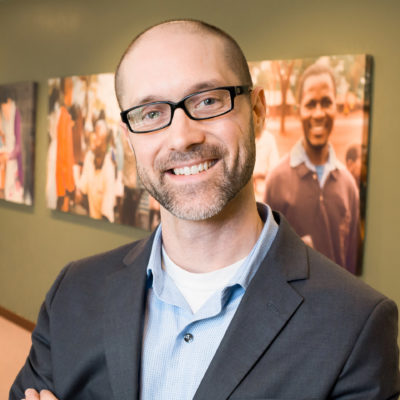
The Process of Discipleship
I was recently speaking with a ministry leader who was desperately trying to mentor to a young woman who just refused to listen. Despite her affirmation of her belief in Jesus and desire to be a disciple, she continued to believe that it was acceptable to live with a lifestyle the Bible makes clear is sinful and destructive. Despite the leader’s best efforts to communicate what scripture teaches, this student simply refuses to acknowledge the truth.
This ministry leader looked at me with sincere compassion and concern in her eyes and asked, "How can I love this young girl and hold to the truth at the same time?" The question was asked in a room full of people listening in, and it was as though you could feel that question resonate with every other person listening. Her struggle is real. This leader had discovered that she couldn’t just point to the Bible and tell this young woman that her behavior was running contrary to Scripture and that she ought to change. A simple, “You’re being sinful” was never going to get through.
Beating the drum that people are sinners and in need of repentance is not nearly as effective as it once was. In our age of relativism, sin has joined the crowd. The Bible has been reduced to a mere suggestion, not always relevant instruction in the modern world. Our students are silently being taught that to accept and love another is to affirm their behavior—no matter the sin. And sadly, many students have brought that thinking into their Christian faith. There once was a time when sinful behavior in students was an act of rebellion against what was considered normal adult behavior. Today, those same sins are the new normal.
So how in the world can we guide students toward righteousness and Christ-like behavior when doing so means we, as leaders will be typecast as intolerant, out of touch, and hateful? Thankfully we as leaders have some incredible opportunities to connect students with the truth of the Bible without excessive or damaging confrontations by showing unconditional love without acceptance of sinful and destructive behavior, and allowing life experience to be the greatest teacher.
Love them through it.
We have all done it. We have all attempted to counsel a student only for what you thought was going to be a great session of repentance, forgiveness, and spiritual guidance ends in utter disaster. The student you were counseling walks away more confused, more frustrated, and more disengaged with their faith than when they entered your office. It is because when we are confronted with some sort of sin a student is regularly engaged in, our first reaction is often to sit them down and give them a good talking to. But why didn’t the plan work?
The one great thing about this new generation of students coming through high school is that they are looking for adult advice and mentorship. So maybe now, more than the last twenty years or so, leaders have a captive audience. But that doesn't necessarily mean they want to be sat down, lectured at, and told that they are wrong. You may not have intended to, but in their world, you just told them that you don't accept them. Consequently, since you are an adult Christian, ideally representing Christ, then Jesus no longer accepts them either. Remember affirmation equals acceptance. Because more often than not, the behavior they are engaging in is acceptable in their eyes—especially if it expresses love and kindness in some ways. They are expecting you to affirm them, not rebuke them.
I have seen students cheat and think nothing of it.
I have seen students engage in sexual activity and believe it to be normal and acceptable for their age.
I have seen students feel left out if they are not questioning their gender
I have seen other students witness these sins and actively ignore them for fear of offending and being perceived as unloving.
So what can you do? Empathize and lovingly express your opinion without judgment. Continue to be a mentor by not shunning them or shaming them. Remember how Christ treated the adulterous women the Pharisees wanted to stone (John 8:1-11)? In dramatic fashion, Jesus drills home the point that in one way or another we are all sinners. We all have our baggage, our issues, and our struggles. Putting ourselves in the same situation, the least we would desire from another Christian brother or sister, much less a mentor is to be loved without condition.
Jesus did not condemn the woman, but he also did not affirm her sinful behavior. He told her to go and sin no more. So many of us, without ever realizing it, stake our entire claim as Christians on the act of love, yet we add countless conditions to it. However, the command of Jesus is to love without condition. Meaning regardless of circumstance, position, behavior, or state of mind, we love others. It is love without stipulation.
To love without acceptance of their behavior reinforces the narrative that acceptance does not mean affirmation. It reinforces for the student that their worth is judged only in God’s eyes, not their world. This allows space for a deeper discipling relationship with that student and thereby opening doors for further conversation. It was the very truth that Jesus was conveying to the woman, the Pharisees, and anyone else looking on. Discipleship takes time. Repentance takes patience. And none of it happens without relationship. Remove it, and hope is lost.
Letting the consequences do the teaching.
My two-year-old boy is all boy. He plays rough, jumps on his sisters, loves his cars, and even at two years old, makes some very poor choices when playing. Often I am aware that his decisions may lead to a slight injury and ensuing tears. Nothing that results in an ER visit, but painful choices nonetheless. My natural response is to stop it long before it happens. But what every parent soon discovers is that stopping him or her in the moment does not change behavior. But the consequence does. The bruised knee, the bump on the head, or the cut lip all painful consequences of poor choices. I want my son (and my daughters) to experience some minor pain as a result of poor choices so they will make wiser decisions in the end. Of course, if it were a matter of life and death or a trip to the ER, that would require an entirely different response.
I frequently tell my children that failure is a far better teacher than success. The same principle often applies as we raise our students spiritually. Every parent knows that we cannot make our kids behave perfectly all the time. But with every stumble and failure comes an unforgettable lesson. As painful as it is to mention sometimes we need to let our students go through a painful spiritual lesson.
So that means in the end, we may have to do the hardest thing of all, do your job and let God do his; it never your job to convince anyone or change anyone’s mind. Your job is to be faithful. Continue to pray, but leave the results to the Spirit of God. Because when the consequences come, when the person hits rock bottom, when life gets hard, they will need a community of Jesus people to come alongside and be the embodiment of Immanuel that they will be desperately crying out for.
But that may not happen for several years—or at all.
No matter the result, you have been called to be the representation of Christ in their lives. Work to do that job as perfectly as you can.
Discipleship is not a moment. It is a process. It requires patience, investment, heartache, and the hard conversation. It is wrought with failure, ripe for success; beautiful when we get it right, and painful when we get it wrong. Every generation brings with it is unique challenges, but also brings with it incredible opportunities. The truth you live alongside your students reaches farther and speaks louder than any competing narrative. In all of it continue to fight for the relationships that matter, keep praying for the souls of our students and continue being a witness of the power and presence of the Holy Spirit in the life of the church and the lives of our students.
Steve Kozak
Executive Director of AwanaYM
Steve currently serves as the Executive Director of AwanaYM. Previously, Steve spent over a decade teaching high school theology and apologetics from Detroit to LA. Steve holds a Masters degree in Theology from Moody Theological Seminary and a Masters in Christian Apologetics from Biola University. Steve is also an adjunct professor at Trinity International University. He speaks and writes on youth ministry, youth culture and apologetics. He resides in Chicago, IL with his wife and four children.FollowSteve Kozak on Twitter: stevenmkozak
Comments
Get the AwanaYM Update
Receive youth ministry resources in your inbox. Subscribe today!
